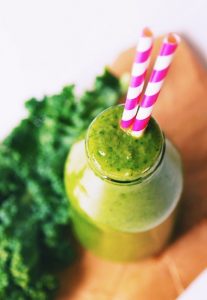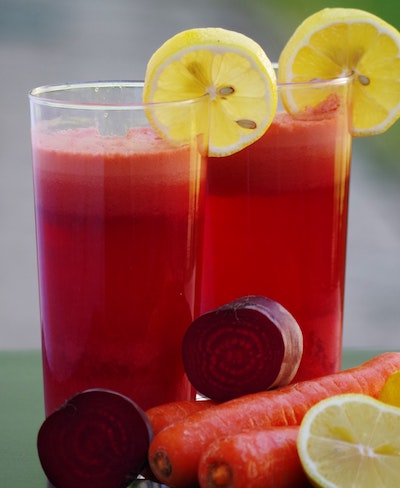In the past decade nearly 30 studies have shown that beet root juice is highly effective in reducing cardiovascular risk factors, such as blood pressure. The primary reason dates back to a 2008 study showing that the bioactives in nitrate-rich foods are primarily responsible for their ability lower blood pressure. Despite beets’ superior reputation for health and wellness, many people simply can’t tolerate them as single food. This study, published in the Journal of Nutrition and Metabolism, provides hope for beet haters or for those who cannot consume enough on a regular basis. Researchers studied the short-term effects of a complex novel, two-ounce nitrate-rich fruit and vegetable supplement (FVS) (AMPED NOx, Isagenix International LLC) on plasma nitrates/nitrites and endothelial function in healthy young men (see below for complete list of ingredients).
A number of studies show that vegetables spinach, lettuce, fennel, rocket, radishes, Chinese cabbage, and  parsley are high in nitrates, as well as other nutrients and phytochemicals including vitamins C, E and K, carotenoids (lutein and beta-carotene), flavonols (quercetin and kaempferol), folate, iron, zinc, calcium, and magnesium.
parsley are high in nitrates, as well as other nutrients and phytochemicals including vitamins C, E and K, carotenoids (lutein and beta-carotene), flavonols (quercetin and kaempferol), folate, iron, zinc, calcium, and magnesium.
The researchers evaluated the efficacy of the FVS fruit and vegetable liquid supplement versus a juice low in nitrates (prune juice, PRU) on circulating nitrates/nitrites as well as cardiovascular parameters in 45 healthy normotensive men (18–40 y). Blood pressure, flow-mediated dilation (FMD), and plasma nitrates and nitrites were measured at baseline and after two weeks of supplementation (2 oz/d). Subjects also completed questionnaires on sleep quality and mood since these measures have been associated with endothelial function.
Study Results:
- FVS significantly increased plasma nitrates and nitrites (+67%, p < 0.001).
- FVS decreased diastolic blood pressure (−9%, p � 0.029) after two weeks. Diastolic, but not systolic, blood pressure fell significantly for participants in the FVS group over the course of the 2-week study in comparison to the PRU group (−5.3 ± 7.0 and −2.2 ± 7.7 mmHg respectively, p � 0.028.
- By week one, plasma nitrates and nitrites rose markedly in the FVS group in comparison to the PRU group and levels remained elevated at week 2 (34.1 ± 57.6 and −9.7 ± 21.0 μM, respectively, p � 0.001).
- The change in FMD for FVS supplementation versus PRU supplementation was not significant (+2% vs. −9%, respectively, p � 0.145).
- Changes in sleep quality or total mood state did not differ between groups after the 2-week study.
- The nitrate-rich FVS supplement increased plasma nitric oxide (NO) and reduced diastolic blood pressure in young normotensive men, but increased plasma NO was not associated with improvements in FMD, mood, or sleep.
Blood pressure levels are a strong predictor of both vascular and nonvascular diseases, and their predictive power for vascular disease is stronger than that for blood cholesterol concentration or cigarette use. Hence, the value of identifying strategies to lower blood pressure is clear. ~ researchers concluded.
The FVS contained 7880 mg of a proprietary blend of nitrate-rich extracts from beetroot (Beta vulgaris), celery stem and leaf (Apium graveolens), and red spinach leaf (Amaranthus dubius). Additional ingredients included stevia leaf extract (Stevia rebaudiana) and a blend of fruit and vegetable extracts (green tea leaf, red grape, white grape, bilberry, carrot, grapefruit, papaya, pineapple, strawberry, apple, apricot, cherry, orange, broccoli, green cabbage leaf, onion, garlic, black current, asparagus, tomato, olive, and cucumber).
Conclusion / Daily consumption of a two-ounce FVS raised blood nitrates/nitrites and resulted in a hypotensive effect in normal healthy males. This increase in plasma nitrates/nitrites was not associated with changes in FMD, mood or sleep. While the implications of these results will require further evaluation, this study adds to a growing body of evidence suggesting that even small amounts of dietary nitrates may be an effective nutritional strategy to regulate healthy diastolic blood pressure and provide cardioprotection.
Source: Sweazea KL, Johnston CS, Miller B, Gumpricht E. Nitrate-Rich Fruit and Vegetable Supplement Reduces Blood Pressure in Normotensive Healthy Young Males without Significantly Altering Flow-Mediated Vasodilation: A Randomized, Double-Blinded, Controlled Trial. J Nutr Metab. 2018 Sep 16;2018:1729653. doi: 10.1155/2018/1729653.
To gain access to this article and the rest of our extensive database of full-text articles, please register below or log in here.





